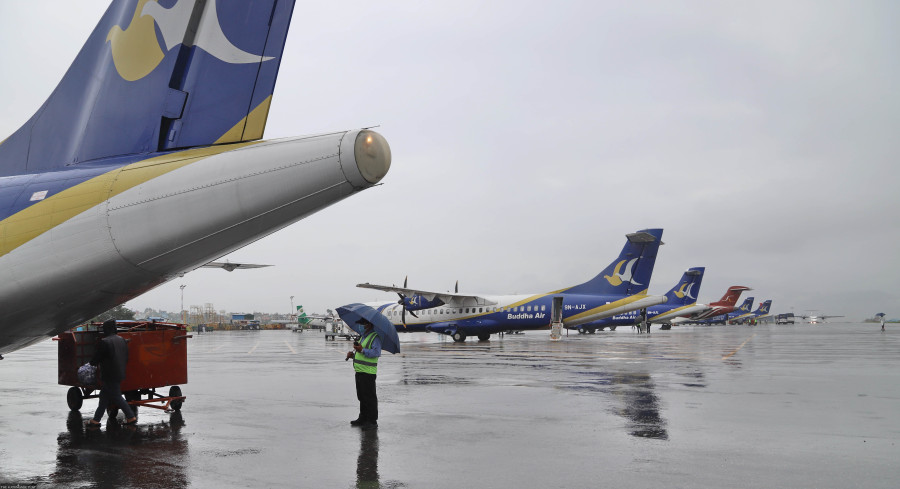Money
Two crucial aviation bills sail through upper house
After the bills become law, the Civil Aviation Authority of Nepal will be split into regulator and service provider.
Sangam Prasain
Nepal moved one step ahead in the effort to streamline civil aviation and enforce safety regulations as per world standards after the upper house on Monday unanimously passed two bills allowing the Civil Aviation Authority of Nepal to be split into regulator and service provider, which is also one of the requirements set by the European Union for Nepali carriers to be allowed back in Europe.
The endorsement of the Civil Aviation Authority of Nepal Bill and Air Service Authority of Nepal Bill by the National Assembly means the government can now register them at the House of Representatives for deliberation and approval.
The two pieces of legislation will become law after they are signed by the President, and will become effective 31 days after enactment. The bills languished in the upper house for a year and a half as political squabbling engulfed the country. They were registered on February 23, 2020.
“These two crucial bills were unanimously passed on Monday,” lawmaker Jitendra Narayan Dev, told the Post.
“The government is in a mood to fast track the process, and the opposition parties too want the bills to be passed as early as possible,” he said. “If the lower house session runs for three more weeks, they will hopefully be passed.”
The fragmentation of the civil aviation body into two entities will increase accountability and ensure that the service provider will be exclusively responsible for safety and facility of the passengers and the industry as a whole while the regulator will oversee the regulatory enforcement, said Dev, a former tourism minister.
The legislation envisages integrating previous acts to eliminate conflicts and contradictions at the Civil Aviation Authority of Nepal, which is currently functioning as both regulator and service provider from the same office, and there is no clear demarcation between its duties and organisational structure.
“These key bills were discussed thoroughly at the Legislation Management Committee,” lawmaker Uday Sharma Poudel told the House. “The draft bills went through 109 changes before they were presented to the upper house.”
The government has been working to separate the civil aviation body for a long time; but due to various reasons, it has not happened.
“We hope that the European Commission will remove Nepali carriers from the air safety list after the civil aviation body is broken up,” Minister for Law, Justice and Parliamentary Affairs Gyanendra Bahadur Karki, who presented the bills on behalf of Prime Minister Sher Bahadur Deuba who is also looking after the Tourism Ministry, told the upper house while responding to the concerns of lawmakers.
Due to the delays in passing the legislation, several international aviation safety agencies have even slammed Nepal’s poor progress in ensuring air safety.
The Civil Aviation Authority of Nepal said it was conducting an internal assessment regarding hiring and other organisational requirements to prepare for its coming fragmentation.
“We are ready to function as two bodies as soon as the bills are passed into law,” said Rajan Pokhrel, director general of the Civil Aviation Authority of Nepal.
The government has been working on the proposed legislation for the last 10 years, but it has been plagued by bureaucracy at every step. Following pressure from a number of global aviation watchdogs, the cabinet gave the go-ahead to the Tourism Ministry in July 2019 to draft two separate aviation bills to break up the Civil Aviation Authority of Nepal.
In December 2013, the European Commission imposed a blanket ban on all airlines from Nepal from flying into the 28-nation bloc after the September 2012 crash of Sita Air Flight 601 in the Manohara River that killed 19 people, including seven British citizens.
No Nepali airline was flying to the European Union then, but the commission became concerned enough to prevent them from entering the continent after a spate of air crashes in Nepal. Between 2008 and 2012, there were at least two air crashes annually.
The European Commission put Nepal on its air safety list, banning all carriers certified in Nepal from flying into the EU because of significant safety deficiencies requiring decisive action.
In 2014, Spanish consultancy INECO prepared the first draft of the proposed legislation with a $4.2 million funding from the Asian Development Bank following approval from the board of the Civil Aviation Authority of Nepal in 2010.
Since then, a number of drafts have been prepared and thrown away. The latest draft of the bill was prepared by a consulting firm of former law secretary Raju Man Singh Malla and reviewed by the Tourism Ministry.




 19.12°C Kathmandu
19.12°C Kathmandu













